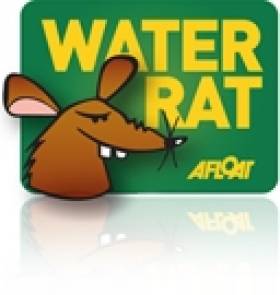Displaying items by tag: rat
Should Ben Ainslie Land in Hot Water?
#BEN AINSLIE – As Britain's sailing superstar awaits a hearing with the Royal Yachting Association (RYA) over the incident at the World Championships in Perth last December, the consensus in the electronic media is that he has been hard done by and blame should be attributed to the media boat that caused the wash that was at the centre of the row. While quite a few of the commentators believe that the two race disqualification for gross misconduct that cost Ben Ainslie the World Championship is more than adequate punishment, Water Rat sees some similarities with soccer star Eric Cantona's transgression in 1994 that resulted in 120 hours community service and an 8 month ban from the sport.
To re-cap, Cantona was sent off in a Manchester United v Crystal Palace game for a kick on a Palace defender. As he reached the sideline Cantona launched himself into the stands and kicked a supporter in a kung-fu style following up with a series of punches. Cantona was arrested and convicted for assault, but the original two week sentence was overturned and replaced by 120 hours of community service. His team, Manchester United, suspended Cantona for the remaining four months of the season and he was fined £20,000. The Football Association increased the ban to eight months and fined him a further £10,000. Football's International body, FIFA confirmed the suspension as worldwide. Cantona also lost the captaincy of the French team.
The International Jury found as fact that Ainslie had committed an act of physical aggression, that was not only a gross breach of good manners but also brought the sport into disrepute.
The Football Association's statement is worth quoting: 'The members of the FA Commission are satisfied that the actions of Eric Cantona following his sending-off at Crystal Palace in the Manchester United match on January 25 brought the game into disrepute. Eric Cantona has therefore been in breach of FA rules. After taking into consideration the previous misconduct of Eric Cantona, the provocation he suffered, the prompt action taken by Manchester United, Eric Cantona's expression of regret to the Commission, the apologies he conveyed to those affected and the assurances he gave to his future conduct, the members of the Commission decided that Eric Cantona should be suspended forthwith from all football activities up to and including 30th September 1995 and in addition fined £10,000.'
It is worth noting that Ainslie also apologised, but his reaction to the Jury's decision was to criticise their reaction. RYA's Olympic Manager also denied that an assault occurred.
Respected sailor, sailing author, judge and America's Cup umpire Brad Dellenbaugh commented: "It's interesting to see the spin, particularly from the RYA. While not condoning Ainslie's actions, it seems they are trying to lay this at the feet of ISAF for inappropriately trialing new television initiatives at the Worlds, then at that feet of the Jury for not letting the Championship be determined by the sailors on the water. The chance to win his sixth Worlds was taken away from him.
What fails to get mentioned is that he WAS winning the Worlds despite getting screwed by the wake. Stay in his boat; win the Worlds. The reason he didn't win the Worlds is because he couldn't control his anger and he boarded another boat. Period! I wonder how Elvstrom would have reacted."
The RYA Tribunal will now consider the incident and the sailing world will be fascinated to see how they deal with Ainslie. RYA's own guidance to Race Officers rates physical or threatened violence as 4-5 on a scale of 1-5.
Despite the apparent overwhelming sympathy it is difficult to see how RYA can avoid further sanction in this case. The question probably is what is an appropriate penalty. Given the strength in depth of Britain's Finn sailors, a ban of Cantona-like proportions would not cause great damage to GBR's prospects, but many would feel that denying (for the time being anyway) Ainslie's opportunity to become the greatest sailing Olympian would be too harsh.
Ainslie won the British trials comfortably securing the nomination almost a year in advance. Maybe a re-trial would be a just punishment, opening the door a crack for Giles Scott and Ed Wright. For Ainslie, being asked to prove himself again might not be much more than an inconvenience, but the message sent by the Tribunal would clearly state that no person, however great their stature, is beyond reproach.





























































